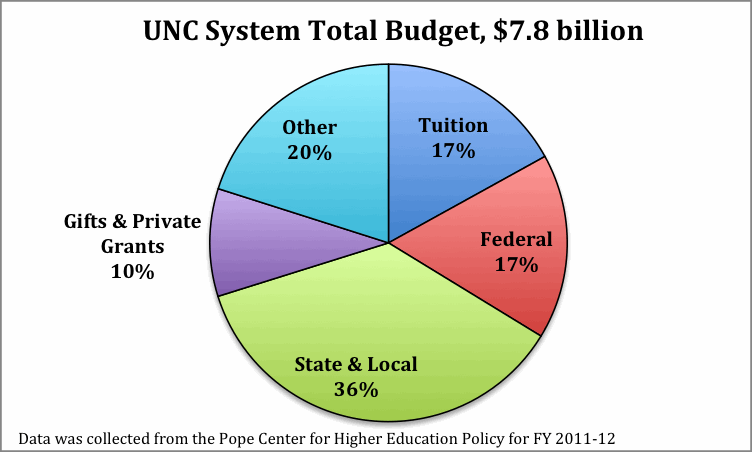The dust is settling following approval of the budget by both chambers of the General Assembly last week. It now awaits the governor’s signature to be formally enacted into law. Many referred to this budget as the "teacher bill" since much of the debate and focus was on the K-12 teacher salary increase. One area of the budget that usually gets its fair share of debate went largely unnoticed — the University of North Carolina System.
Just like Public Education and the Community College System, the UNC System receives a large portion of its budget from the state’s General Fund. Approximately 36 percent of the total UNC budget comes from state and local tax dollars. There are sixteen schools in the UNC System, some receiving more money than others based upon size, classes offered, hospitals or research facilities operated by the university, and other factors. Those schools receiving the most state money are UNC Chapel Hill and NC State while NC School of the Arts and Elizabeth City State University receive the least.
It is interesting to point out that the UNC System is funded like so many other government program –through multiple streams of revenue. The UNC System receives money through student tuition; federal, state, and local taxes; and private grants and donations. In total, there are more than 23 streams of money that compose the total UNC budget every year. In FY 2011-2012, the total cost of the UNC System was $7.8 billion. According an article from the Pope Center for Higher Education Policy, "As a percentage of its budget, North Carolina spends more than the national average on higher education. And in real dollar terms, North Carolina spends more of its general fund on higher education than any other state in the Southeast."

In a year when legislators needed to find extra cash to fill a budgetary hole in a growing Medicaid program and also give teachers a pay increase, the UNC System not only avoided cuts, but had their total General Fund appropriation increased by $29.5 million or 1.8 percent over last year. The total General Fund appropriation for the UNC System was $2.6 billion for fiscal year 2014-15. Legislators didn’t put anything aside for the savings reserve and shifted most of the repairs and renovations to two-thirds bonds in this budget; the UNC System should be thankful their budget wasn’t cut like so many other areas of state government.
Here is a list of the major items in this year’s UNC budget:
- $317,500 for Pilot Internships for 60 students at Historically Black Colleges and Universities (HBCUs) with NC-based companies — Elizabeth City State University plus three other HBCUs will be selected through a competitive application process and will participate. One must be an HBCU within the UNC system and two must be private HBCUs located in North Carolina.
- $350,000 for the NC State College of Agriculture and Life Sciences plant science initiative, and $250,000 for a food processing initiative
- $1.2 million for a new teacher support program
-
$2 million in state matching funds for a federal program in manufacturing innovation for power electronic devices
-
$3 million for data sciences program research at UNC Charlotte
-
$2.4 million cut through management flexibility reduction in the UNC budget
-
$19.1 million increase for the Need-Based Financial Aid Forward-Funding Reserve
-
$1 million for the College Foundation of NC
-
$50,000 for National Guard Tuition Assistance
-
Need-Based Scholarships switched from non-recurring to recurring funding
-
$4,863,276 for the Yellow Ribbon program allowing in-state tuition for eligible military veterans and dependents
-
Eliminated $1.8 million in funding for the Teacher Preparation Distance Education Reserve
- Reduced funding by $1,001,737 for building reserves due to delays in completion dates
-
Removed $7.1 million due to a revised enrollment growth model that shows fewer students than originally projected
- $18.2 million for a $1,000 salary increase for employees (~$1,236 salary and benefits)
- $5 million for a salary increase for employees exempt from the State Human Resources Act
- $5.4 million for a contribution to the State Employees’ Retirement System and 1% cost-of-living adjustment for retirees
While many will argue there are areas to be cut within the UNC System, the fact is that they weren’t cut during this budget session. There are many moving parts in the state’s budget, and only time will tell if the UNC System will be so lucky during the next budget cycle.
Click here for the Fiscal Update archive.
You can unsubscribe to this and all future e-mails from the John Locke Foundation by clicking the "Manage Subscriptions" button at the top of this newsletter.


